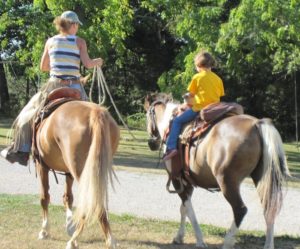 Maybe you’re like me: white and privileged enough to own horses. From our rural, mostly peaceful, mostly white communities, it might be easy to ignore the massive protests over systemic injustice. It might be easy to dismiss the protests as flash points soon to fade, bumps in the already bumpy road of 2020.
Maybe you’re like me: white and privileged enough to own horses. From our rural, mostly peaceful, mostly white communities, it might be easy to ignore the massive protests over systemic injustice. It might be easy to dismiss the protests as flash points soon to fade, bumps in the already bumpy road of 2020.
We horse owners often practice a ‘live and let live’ philosophy, happy to stay in our lanes and keep to ourselves. What do the deaths of blacks in big cities have to do with us?
Listen to this podcast, “Can We Talk About Whiteness.”
I’m reminded of the words set in granite at the New England Holocaust Memorial in Boston, written by Martin Niemoller, a German Lutheran pastor:
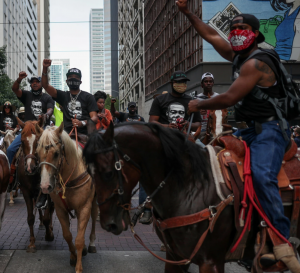
Protesters in Houston. NY Times photo
They came first for the Communists and I didn’t speak up because I wasn’t a Communist.
Then they came for the Jews, and I didn’t speak up because I wasn’t a Jew.
Then they came for the trade unionists, and I didn’t speak up because I wasn’t a trade unionist.
Then they came for the Catholics, and I didn’t speak up because I was a Protestant.
Then they came for me, and by that time no one was left to speak up.
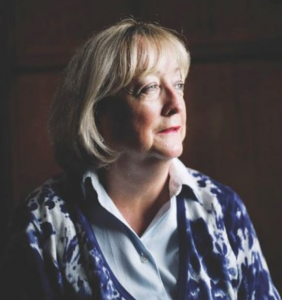
Monica McWilliams
Systemic injustice is a scourge that makes its victims feel unsafe and targeted. Blacks in America feel unsafe and targeted, but it could be anyone anywhere.
Systemic injustice was part of a conversation I had with Monica McWilliams twenty years ago in Boston. McWilliams co-founded the Northern Ireland Women’s Coalition and won seat in that country’s original Legislative Assembly. I reported on her U.S. visit to receive a Woman of the Year award.
A Catholic from south Belfast, she took part in the peace talks leading to the historic Good Friday Agreement, which largely ended the Troubles, a decades-long period of sectarian violence and political unrest effecting the United Kingdom, the Republic of Ireland, and, peripherally, the United States. Nearly 4,000 people died during the Troubles. Half were civilians.
For generations in Northern Ireland, Catholics had felt unsafe and targeted. McWilliams told me a simple story of shoe shopping:
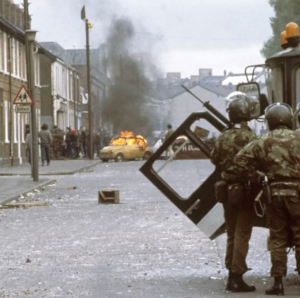
An image from the Troubles in Belfast, Northern Ireland
Her son was to receive his First Communion and needed white shoes to go with his outfit. Harried and in a hurry, they stopped at a shoe store in a Protestant neighborhood. Not realizing the dangerous gravity of his words, her son complained loudly about all the Communion fuss. Heads turned. Smiles turned to frowns. They were not welcome in this shop or in this neighborhood.
Systemic injustice takes all shapes in its goal to keep the powerful in power and to keep down those being dominated. The Irish know what it is. In Dublin and Belfast, they are protesting against systemic injustice after George Floyd’s murder.
Sure, not all horse owners are “privileged” if we think of it in terms of socio-economic status. I was talking about this with my friend, Forrest Van Tuyl, a musician and working cowboy in Oregon. I asked him what he thought of the white privilege in the working cowboy world. “Cowboying is a choice. Being born black is not.” Privilege is not just about money advantages. It’s about systemic advantages that make it less likely for people of color to succeed.
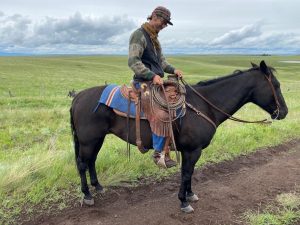
Forrest Van Tuyl in Oregon
If you’re a woman, you know what it feels like to be targeted and unsafe. As a reporter, a runner, a laborer on construction sites, I’ve experienced systemic injustice. I’ve felt vulnerable and targeted. How about you?
If you’re a horse owner, you know what power and dominance look like, too. Generally, we show up for our horses with courage, support, compassion, and a sense of responsibility. But there are sickening possibilities whenever power over another being is possible: violence. Or worse, sanctioned violence. It’s an ugly mix of fear aggression and cowardice that has hurt and killed scores of our equine partners.
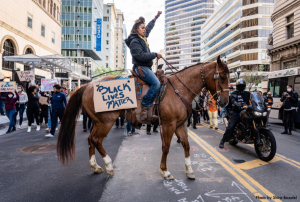
Brianna Noble in Oakland. PHOTO by Shira Bezalel
Pause for a moment and think about where you cross paths with systemic injustice. It might seem like we’re far removed from the treachery and pain that’s unfolding today – mostly in big cities without a horse in sight – but if you look more closely, you’ll see just a few degrees of separation. Ask yourself: are you minding your own business or sticking your head in the sand? Let’s counter this year’s fear, ignorance, and cynicism with joy, knowledge, and compassion. Let’s join the conversation and be part of the solution.
Props & Calls to Action:
- We’re thrilled to see Chronicle of the Horse engaging in conversation over systemic injustice, white privilege, and horse world silence.
- Check out Ta-Nehisi Coates’ article on the Case for Reparations in the Atlantic (not because of slavery, but because of systemic discrimination in federal housing and loan programs). A recommendation from Forrest Van Tuyl.
- We follow social media pages that can help educate us and recommend courses of action.
- We encourage readers to educate themselves with books, documentaries, and other sources of reliable material.
- We support involvement in organizations striving for effective change.
Read about Brianna Noble, horsewoman and Oakland protester (photo above, left). Read this story of her in Heels Down magazine.
Read about Compton Cowboys, who attended the Best Horse Practices Summit. Photo, from their Instagram feed below.
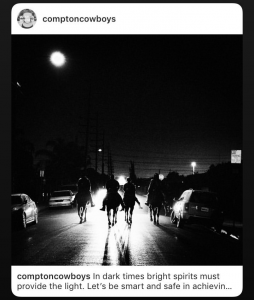
Only days ago I would’ve agreed with everything you said! But since then my eyes have been opened to some sinister stuff going on behind the scenes of what we think is real. I’m all for peaceful protests! But non-peaceful ones such as black lives matter have me concerned. Because you’re a journalist and because you’re ready to stand outside your white privilege comfort zone, please watch the 10 part documentary series: The Fall of the Cabal. You will never look at anything the same again!
Elaine. Thanks for your comment. It looks like you have fallen victim to QAnon and conspiracy theories. Fall of the Cabal is not legitimate journalism.
Key point: We’re all connected.
Marianne Williamson was exactly right about the need to make reparations. She had my vote way back when.
Also, it’s becoming harder by the day to discern “legitimate” journalism. Sorry Maddy, but as Bob Dylan sang “everythings’ a changin’.” In other words, there’s a lot of redefining going on along with new perceptions.
Let’s continue to emit positive vibes and not cave into pressure to fear.
Wow thank you for this article, I’ve got tears reading it early in the morning here in CA. I’ve got the real feeling that we’re finally at a tipping point over race relations, and the way we process so much available information will be the formula for our healing. I’m sharing this article on fb.
Powerful words….thank you…
Thank you for putting your thoughts into such powerful words, Maddy. Thank you, also, for sharing these excellent resources. I would add Robin DiAngelo’s White Fragility to the reading list, along with Chimamanda Adichie’s Americanah. I think we also need to work on make the horse world a more inclusive, more diverse space. I love dressage, but can’t stand the lily-white demographics. Horses are good for people – all people, not just white people.
Thanks, Ms. Butcher, for making your reporter training primary and putting civic service upfront. Thank you for sticking up for quality journalism in general. Though it has arguably become difficult for some to discern good reporting, it is no more difficult than learning to sit the trot or care for a barnful of horses. For decades I have depended on old-school analysis by the “On the Media” team and their a weekly dose of graduate-level J-school wisdom to make sense of the increasingly opaque news landscape: http://www.wnycstudios.org/story/on-the-media-communication-breakdown/
Tip O’Neill’s tenet that “All politics is local” has become sadly obvious for me since COVID-19 raised its spiky head. Our three local feed store options flaunt their pro-status-quo, anti-systemic change positions in various ways obvious to their customers, from bumper stickers to flags to their flouting of local mask-wearing ordinances. Though I have no other choices, supporting any of them with my hard-earned money galls me. That said, my own silence has begun to gall me more. Not sure how I will address this discomfort, but I know I must.